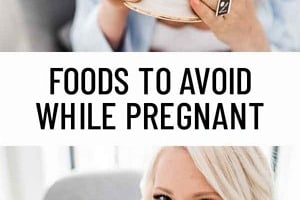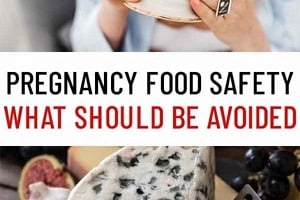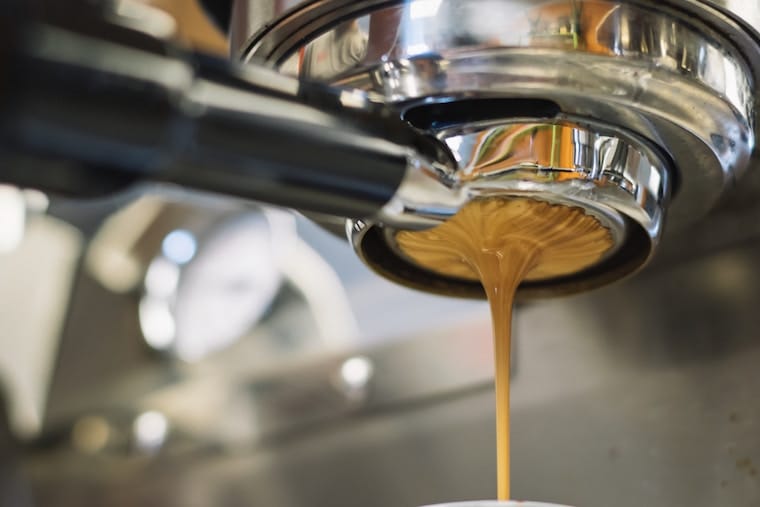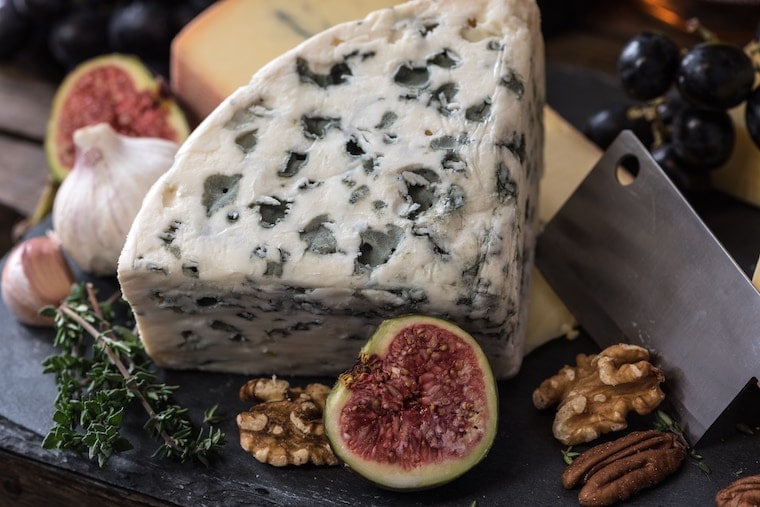I'm Pregnant What Can I Eat From Starbucks



I have compiled the most extensive list ever of foods to avoid in pregnancy to serve as a quickie guide to pregnancy food safety.

You guys know I'm a hardcore foodie. Aside from maybe jellyfish and geoduck, there isn't a whole lot I don't like to eat. I also travel a LOT for good food and save up all of my money for tasting menus at Michelin star restaurants. Often you don't know what you're getting until it's sitting right there in front of you. When I travelled during my pregnancy between 24-26 weeks, I was constantly googling "can I eat this while pregnant" at every meal. You may never need to know about some of the foods to avoid in pregnancy that are on this list depending on what kind of diet you have, but if you're ever in doubt, you know you can come HERE to get the 411 on pregnancy food safety.
Why are there Foods to Avoid in Pregnancy?
Whether food safety and handling excites you or not, it's one of those things you have to be aware of because of the potential consequences that could arise with improperly prepared foods. This is true for us all of the time, but it's particularly problematic when it comes to pregnancy food safety. Pregnant women and their unborn babe are particularly vulnerable to foodborne illnesses (e.g. listeriosis, salmonellosis, campylobacteriosis, toxoplasmosis) because the mother's immunity is weakened while pregnant, making it difficult to fight against them. Listeriosis, caused listeria bacteria, is one of the more common and dangerous ones because it can cause illnesses for newborns, stillbirths and miscarriages.
Even if you think chances are low for contracting a foodborne illness or ingesting something harmful, it's often better to play it safe because the health of your baby is so much more important than eating any risky food. Yes, some of the foods to avoid listed here are maybe unlikely to be problematic, but if you ever feel that you may end up feeling guilty or worrying about pregnancy food safety while eating your meal, it probably isn't going to be that enjoyable anyway. Let's take a look at some of the riskiest foods to avoid.
The Common List Foods to Avoid for Pregnancy food safety

The following foods are common foods to avoid for pregnancy food safety. Make sure you give these a good look over so you're prepared the next time you're wondering, "can I eat this while pregnant?"
- Alcohol: You know this one, but it's recommended you cut out wine, beer, hard liquor and spirits to be safe. Risk: Linked to Fetal Alcohol Syndrome, miscarriage and stillbirth.
- Cold deli meats and charcuterie: Includes pate, charcuterie, ready-to-eat deli-meats, pepperoni, salami, and chorizo. The good news is that these foods may be safe if rewarmed or cooked to steaming, though that may be kind of gross. Risk: Listeria.
- Excessive Caffeine: Limit energy drinks, coffee, tea, chocolate, and caffeinated soda pop to 200-300 mg per day (about 1-3 cups of coffee/day). Risk: Linked to risk of miscarriage, low birth weight and impaired fetal growth.
- High Mercury Predator Seafood: This includes shark, Swordfish, King Mackerel, Tilefish, Marlin, Ahi Tuna, Bigeye Tuna, Orange Roughly and Escolar. You'll want to limit high mercury fish to 5 oz./month and canned white albacore tuna to 10 oz./week. Risk: Methyl Mercury.
- Raw fish/shellfish: We're talking sashimi/raw fish in sushi, ceviche, oysters, clams. Risk: Salmonella and Toxoplasma.
- Raw or undercooked eggs: Unless pasteurized, no soft poached or fried eggs with runny yolks. Risk: Salmonella.
- Raw or unpasteurized dairy: No more unpasteurized cheeses and raw milk. Most hard cheeses are pasteurized, but always double check to be sure. While imported cheeses like parmesan are often not pasteurized, in the case of parm, the heavy salt brine typically prevents bacterial growth. Yay! Risk: Listeria.
- Raw sprouts: No more raw alfalfa, clover, radish, or mung bean sprouts, though cooking them is safe. Risk: Salmonella.
- Smoked fish/seafood: That means no smoked salmon and Lox though you can enjoy it if it's been cooked to steaming hot or if its purchased in a shelf stable can. Risk: Listeria.
- Undercooked meat/poultry: This means carpaccio, tartare, ground meat cooked below 160 F, meat cooked below 145 F, and poultry cooked below 165 F. Risk: Salmonella and Toxoplasma.
- Unpasteurized juices: Go easy on the fancy apple cider, fresh pressed juice, and cold pressed juice. Risk: Listeria.
- Unwashed raw produce: Unwashed or bruised fruits and vegetables can be a higher risk, though you can definitely indulge when they're washed and/or cooked. Risk: Toxoplasma, E.Coli, Salmonella and Listeria.
Can I Eat This While Pregnant? A List of the Less Common Foods to Avoid for Pregnancy Food Safety

For those times when the common list of foods to avoid for pregnancy food safety just isn't comprehensive enough, we have compiled a list of some of the more obscure or even controversial foods. Not all of the foods on the list are necessarily no-nos. We are including some of the ones that are often debated about in mommy groups and sharing the research.
- Artificial sweeteners. It's generally suggested to limit any use of artificial sweeteners in pregnancy since we don't have a whole lot of solid research, and it also displaces nutritious foods in the diet. Having said that, some sweeteners are for sure not safe including Sacharin (Sweet n' Low) and Cylamate. Risk: Fetal complications.
- Bitter Melon/Gourd (in excess). While I haven't been able to find any legit human studies, there is some very small early animal research to suggest that one of the compounds in bitter melon (B- Monorcharin) may be unsafe during pregnancy. It also tends to cause serious digestive issues if consumed in excess, so it may be best to avoid in large quantities. Risk: Early Labour and Diarrhea.
- Blue Cheese (Blue cheese dip or dressing). Blue cheese, even when pasteurized, has a higher moisture and lower acidity content, providing an easy environment for bacteria to grow. Risk: Listeria.
- Canned/plastic bottle-stored food or drink. A lot of canned foods contain BPAs in their packaging which has been linked to higher risk of miscarriage. Always look for BPA free products when possible. Risk: Miscarriage.
- Cantaloup melon. Melon is actually a common source of food borne illness as the bacteria that's on the outside tends to reach the flesh when you slice through it. Make sure to always wash the rind of melon thoroughly before slicing! Risk: Listeria.
- Caviar. Pasteurized caviar is okay in small amounts. Risk: Listeria.
- Contaminated fish. Avoid fish caught from local streams, lakes, and rivers with PCBs (Polychlorinated biphenyls) and look for fresh water fish. You can also get information from your local health department about the advisories related to a specific water body. Risk: PCBs.
- Custard. Custard based desserts may be tasty, but they're often made with raw eggs that aren't completely cooked. They're fine if made with pasteurized eggs. Risk: Salmonella.
- Deli Chicken, Ham or Seafood salad. Like the veggie versions, these bad boys are at higher risk of harbouring bacteria. Risk: Listeria.
- Deli Salads. Yep, I'm talking about the coleslaw at your local deli. It's a small risk, but there is a higher chance these can harbour bacteria. Risk: Listeria.
- Flax seed. Early animal studies suggest flax may have some mild estrogenic effects so should be avoided in very large quantities. Some flax in your diet can help keep you regular, and Health Canada suggest 4-6 tablespoons a day or 2 tablespoons of flaxseed oil a day is generally safe. Risk: Estrogenic effects.
- Fresh Garlic Sauce. It's a favourite at Shawarma shops, but some tend to be made with raw egg whites so again, always check yours is made with pasteurized eggs. Risk: Salmonella.
- Hibiscus Mocktails or Iced Tea. Again, I haven't seen an human studies, but rat research suggest hibiscus may cause implantation issues in early pregnancy. This was one I definitely didn't realize and I drank a ton of hibiscus Passion iced tea at Starbucks. Risk: Miscarriage.
- Hollandaise Sauce. Again, more egg news. Hollandaise is generally made by whisking in a lot of raw eggs into oil that isn't completely cooked. Make sure you're using pasteurized eggs if you're craving it hard. Risk: Salmonella.
- Homemade Caesar dressing. While the commercial stuff is generally OK, a lot of homemade or restaurant dressings are made with raw eggs. Risk: Salmonella.
- Homemade Ice Cream. Commercial brands are typically fine, but some homemade ice creams are made with an egg-based custard that isn't completely cooked. Again, pasteurized eggs are okay. Risk: Salmonella.
- Homemade mayonnaise. Like hollandaise, but cold and therefore totally uncooked. Risk: Salmonella.
- Hot Dogs. There is some concern that foods rich in nitrates, like some hot dogs, are correlated with an increased risk of cancer, so some may choose to limit their consumption while essentially "feeding" their baby. The bigger concern is that processed cured meats may be a source of pathogens, so it's important to cook your hot dogs to steaming before enjoying. Risk: Listeria.
- Hummus. According to food safety reports, hummus is sadly one of the most common sources of listeria, likely because of the tahini. Always make sure to refrigerate your hummus immediately after opening, or make your own at home to be extra safe. Risk: Listeria and Salmonella.
- Jerky. Ugh this one was a tough one for me. Much like any cold cuts, there is a risk with jerky that has been dried at such a low temperature over a long period of time. If you must indulge, it's recommended that you heat it until steaming but I'm not sure what that would do to the texture. Risk: Toxoplasmosis.
- Lemongrass. While the research on this is nonexistent in humans, animal studies did find that high doses of lemongrass (about 500 mg per Kg body weight) was linked to miscarriage and birth defects. The issue is the two compounds, citral and myrcene that are likely problematic in large doses for pregnant women. A little in your Thai take-over every once in a while is likely safe, but I would speak to your doctor about a daily serving or supplements. Risk: Miscarriage and birth defects.
- Meringues. Unless you're cooking the meringues into a firm pavlova or cookies, the egg whites in a meringue are typically uncooked or undercooked. Meringues made with pasteurized eggs are fine. Risk: Salmonella.
- Organ Meat, Liver and Foie Gras. These foods are rich in nutrients, but can provide an excessive amount of copper and Vitamin A for a pregnancy woman if consumed regularly. Risk: Vitamin A toxicity.
- Pineapple or Pineapple Juice (in excess). One of the compounds in pineapple called bromelain has been linked to increasing uterine contractions in rats and petri dishes, but this hasn't been researched well in humans, and the reality is you would have to eat a TON of pineapple to see any measurable impact. Like more than enough to really make your mouth burn. Pineapple is rich in antioxidants and super refreshing when you're feeling morning sick, so unless your doctor says otherwise, it's likely safe to enjoy it in moderation. Risk: Possible preterm labour or miscarriage in excess.
- Protein powder supplements. If you're consuming the occasional protein shake, it's probably no big deal, but due to unregulated herbs, potential unsafe sweeteners, and risk of adulteration due to poor regulation, it may not be a good regular choice. Risk: Unregulated additives.
- Raw Cake Batter. Stay away from raw dough unless you're sure they're pasteurized. Risk: Salmonella.
- Raw Cookie Dough and Cookie Dough Ice Cream. Avoid foods made with raw unpasteurized eggs. Risk: Salmonella.
- Raw Eggnog. This is only really an issue if it's made with unpasteurized eggs and alcohol but the good news is that most commercial brands are typically pasteurized. YAY for eggnog lattes! Risk: Salmonella and alcohol.
- Raw Unpasteurized Apple Cider Vinegar. It's trendy, yes, but like unpasteurized juice, it's risky. Risk: Listeria.
- Raw Untreated, Unfiltered Water. This strangely seems to be all the rage right now, and to our own demise. Risk: Giardia and any other pathogens in the water.
- Sea Urchin. It's fancy yes, and often served raw so you may want to skip this sushi special. Risk: Salmonella.
- Soft or Semi Soft Cheeses (brie, camembert, Havarti etc.). Like blue cheese, softer cheeses have a lower acidity and higher moisture content so they're susceptible to bacterial growth. Risk: Listeria.
- Soft Serve Ice Cream. While technically safe, soft serve ice cream is an unfortunately common source of food borne pathogens, simply because a lot of retailers don't thoroughly clean out their pipes before adding in more dairy. Risk: Listeria.
- Star Anise or Anise Seed. While I couldn't find any solid research, some believe that star anise may impact pregnancy hormones and should be avoided or limited. I would think the occasional Chai Tea is fine, but speak to your doctor before making it a daily habit. Risk: Possible risk of Early Labour.
- Stuffing Cooked inside Poultry. This is a common source of food poisoning for all of us, never mind our mama's to be! The issue is that by the time the poultry cooks (without being overcooked), the inside stuffing doesn't get a chance to cook all the way through and has been soaking in raw chicken juices. Um, NOPE. Risk: Salmonella.
- Tahini Dressings. Although it's super nutritious, tahini, and any dressings that use tahini may be more susceptible to food borne pathogens. Always make sure to refrigerate your tahini and tahini dressings once opened. Risk: Listeria and Salmonella.
- Tiramisu. Made with raw eggs, coffee and liquor, this one is a bit of a triple threat. Risk: Salmonella, caffeine and alcohol.
- Unpasteurized Apple Cider Vinegar. Like cold pressed juice, a lot of fancy ACV is unpasteurized so there's a small risk. Risk: Listeria.
- Unripe or Green Papaya. Unripe or green papaya contains latex which may cause early uterine contractions. Ripe papaya is totally safe and is actually a great source of antioxidants and folic acid so just make sure it's really ripe before digging in. Risk: Early labour.
Herbal Teas to Avoid In Pregnancy

You may be thinking you should switch to herbal if you're trying to cut back on caffeine, but that may not necessarily be your best pregnancy drink. Even though tea is all "natural", the research on herbal tea is sparse and in some cases, there is concern that if consumed in excess, it could be problematic concerning pregnancy food safety for a wide range of reasons. Some herbal products may stimulate uterine contractions, or increase the risk of birth defects. Again, it's likely just a concern if you're drinking large amounts daily, but always speak to your doctor first before making anything a regular part of your routine.
Teas to avoid for pregnancy food safety:
- Aloe
- Alfalfa
- Anise
- Black and Blue Cohosh
- Buckthorn Bark
- Burdock
- Cascara
- Chamomile
- Chai
- Coltsfoot
- Comfrey
- Dandelion
- Devil's Claw
- Dong Quai
- Duck Roots
- Ephedra
- Fenugreek
- Feverfew
- Foxglove
- Ginseng
- Hibiscus
- Juniper Berries
- Labrador Tea
- Licorice root
- Lobelia
- Nettle
- Pennyroyal
- Sassafras
- Senna Leaves
- John's Wort
- Yellow Dock
These teas are safe to drink during pregnancy:
- Red Raspberry Leaf
- Peppermint
- Lemon Balm
- Ginger
Become an Abbey's Kitchen Subscriber
Contribution By: Rachel Shim
More blog posts you might like:
If you liked this blog post on pregnancy food safety then you might also enjoy more blog posts on pregnancy food safety:
- Is a Vegan and Vegetarian Diet Safe During Pregnancy?
- Dangers of Dieting During Pregnancy on Baby's Risk of Obesity and Disease in Adulthood
- 6 Pregnancy Nutrition Myths That Are Total BS: Part 1
- Even More Pregnancy Nutrition Myths That We're Sick of Debunking: Part 2
- Pregnancy Lessons I've Learned About My Body, Weight Gain, and Nutrition While Growing a Baby
- Vegan Pregnancy Diet | Essential Nutrients for a Vegan Pregnancy
Updated on September 27th, 2021

About Abbey Sharp
Abbey Sharpis a Registered Dietitian (RD), regulated by the Ontario College of Dietitians. She is a mom, YouTuber, Blogger, award winning cookbook author, media coach specializing in food and nutrition influencers, and a frequent contributor to national publications like Healthline and on national broadcast TV shows.
You may also like these
Reader Interactions
I'm Pregnant What Can I Eat From Starbucks
Source: https://www.abbeyskitchen.com/foods-to-avoid-in-pregnancy/